Redditor Slammed By Father-In-Law For Leaving The AC On For His Dog In FIL's House
After reading so many stories on the internet about people mistreating their pets, it's refreshing to see a story where someone goes to great lengths to ensure that their pet is treated properly. Stories like this should serve as examples of what it means to provide everything your pet could need, and it's heartwarming to know that people like this exist.
There are plenty of individuals who don't believe that taking care of a dog is easy, but the more stories like this you read, the more you'll learn about what it takes to care for your dog properly.
We're not trying to say that it's the hardest thing in the world because we don't want to discourage you from getting a dog yourself, but we just want to ensure that people know what they're getting into, especially if you plan on getting a more exotic breed, like the husky in this story.
This Reddit user decided to share this story with others in an attempt to figure out if his actions were wrong, and the people of Reddit didn't hesitate to share their opinions.
The story begins with OP explaining that they needed a place to stay while renovating their home, and while they planned on renting an apartment for the necessary time, his father-in-law insisted that they should stay with him.
OP hesitated because his history with his FIL wasn't great, but his wife convinced him that it was all in the past. After discussing everything with the FIL, they moved in. OP made sure that his wife informed the FIL that they were bringing their dog with them and that the dog couldn't handle the heat of the area they lived in, so he needed air conditioning.
Not long after moving in, OP's FIL went on a rant about how foolish it is to leave the AC on just for the dog, so OP offered to cover the cost increase that the additional hour or two of AC would incur, and that's when the FIL exploded. There's more to this interesting story, so make sure you scroll down and read the whole thing.
OP's father-in-law insisted that they stay with him and avoid any unnecessary costs of renting out an apartment
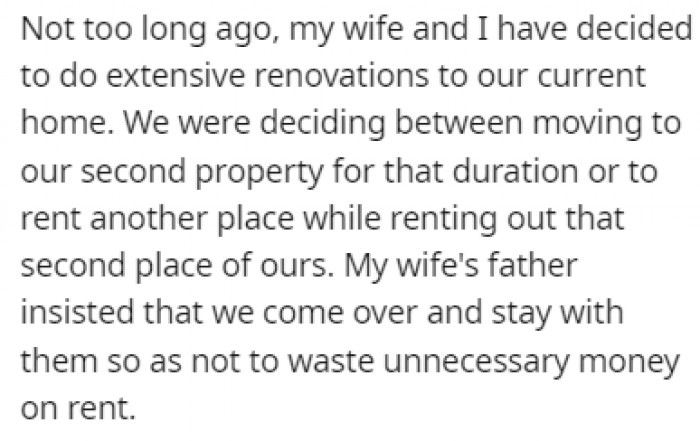
OP didn't like the idea since he had a rather tense relationship with the FIL from the start

His wife convinced him that it was all in the past, and after discussing everything, they moved in with the FIL
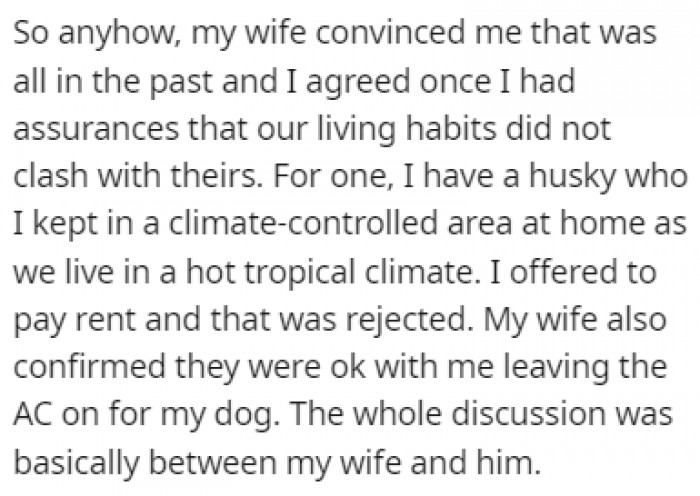
Understanding Perspectives on Pet Care
Pet ownership often generates differing opinions on care practices among family members. Research published in the Journal of Animal Ethics indicates that perspectives on pet care can vary widely based on individual values and experiences.
In this case, the disagreement over leaving the AC on for the dog highlights the differing beliefs about what constitutes responsible pet care within families.
Understanding Family Dynamics and Values
The father-in-law's belief that leaving the AC on for the dog is wasteful illustrates a common conflict regarding family values and priorities. Research in family psychology indicates that differing values can lead to misunderstandings and conflicts, especially in shared living situations. The man's perspective likely stems from his upbringing and views on resource management, while the husband may prioritize the dog's comfort, reflecting a more modern understanding of pet care.
It didn't take long for the FIL to go on a rant about the AC
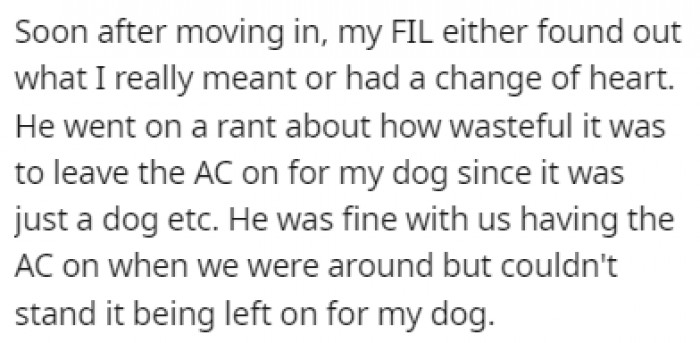
OP offered to pay what was necessary, but his FIL went off on him about being a douchebag
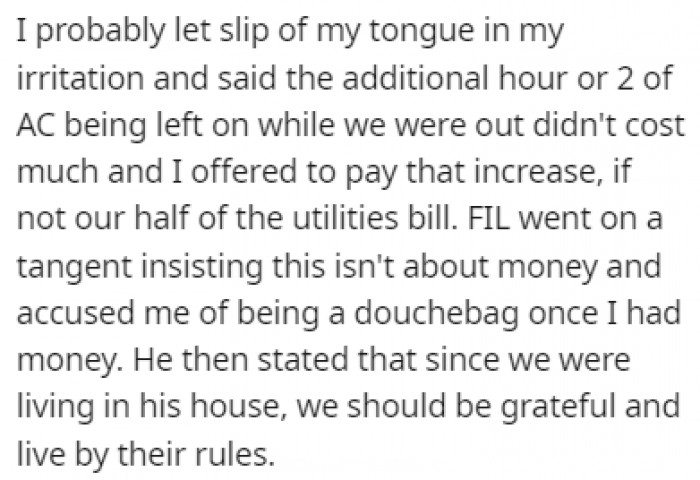
His wife sided with the FIL, and they are accusing OP of being ungrateful

Moreover, the concept of 'emotional attachment' plays a significant role in how pet owners perceive their responsibilities. A study from the University of California, Berkeley, found that pet owners often experience strong emotional bonds with their pets, influencing their decisions regarding care.
In this scenario, the husband's perception of wastefulness may stem from a lack of understanding of the emotional needs of the dog, which can create conflict.
A behavioral psychologist explains that pets are increasingly viewed as family members, and their comfort is considered essential by many pet owners. Studies show that the emotional well-being of pets is directly linked to their owners' satisfaction and mental health. The husband’s choice to prioritize the dog’s comfort over his father-in-law’s concerns reflects a shift in societal attitudes toward pet ownership.
Clear and simple

Sounds about right

He did offer to pay for it
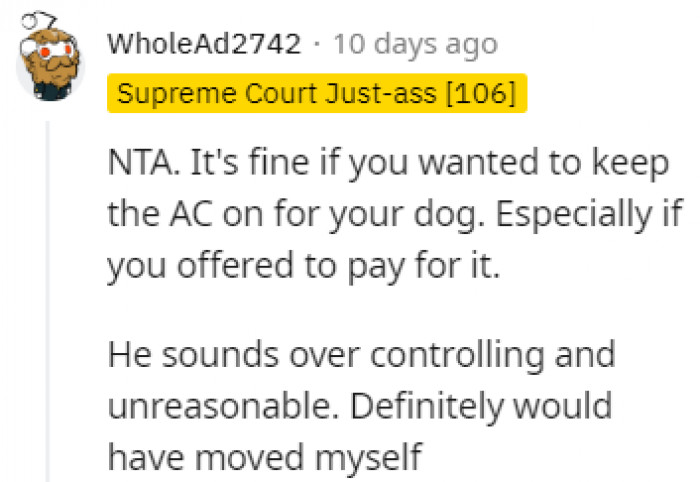
Balancing Responsibilities and Values
Balancing individual values around pet care can lead to family conflicts, particularly when there are differing opinions. Research indicates that when family members hold contrasting views on responsibilities, it can strain relationships and lead to misunderstandings.
In this situation, the disagreement over the AC reflects a broader challenge of reconciling differing values around pet ownership and care practices.
Navigating Intergenerational Conflicts
Intergenerational conflicts often arise when differing values and beliefs collide. Research indicates that these conflicts can create tension within families, particularly when it comes to shared resources or care responsibilities. The husband’s insistence on leaving the AC on for his dog may be seen as an affront to his father-in-law's values, highlighting the need for open discussions about differing perspectives.
Didn't sound very ungrateful

It's sad to see that OP was being accused by both of them because all he wanted was to take care of his dog in the best way possible. This type of behavior should be praised instead of resulting in accusations of him being ungrateful.
Other Redditors showed their support for OP, and now it's your turn to share your opinion on this.
Moreover, it's vital to understand the role of emotional attachment in these discussions. Research shows that emotional bonds with pets can significantly influence decision-making. The husband may feel that leaving the AC on is a form of caring for his dog, which could be dismissed by his father-in-law as an unnecessary expense. Recognizing these emotional underpinnings can help facilitate healthier conversations.
Effective Communication Strategies
Implementing effective communication strategies can help resolve conflicts arising from differing values. Research suggests that expressing feelings and needs in a clear, respectful manner can foster understanding. The husband might consider sharing why the dog’s comfort is essential to him, using 'I' statements to express his feelings without sounding confrontational. This approach can pave the way for a more constructive dialogue.
Additionally, it’s important to explore compromise in these situations. Studies in conflict resolution indicate that finding middle ground can lead to reduced tension and improved relationships. The husband and father-in-law might collaborate on a solution that honors both the dog’s needs and the father's values, such as designating specific times for the AC to be on when the dog is present.
Encouraging Empathy and Understanding
Encouraging empathy can significantly improve family relationships. Research shows that viewing situations from another person's perspective can foster compassion and understanding. The husband could benefit from understanding his father-in-law's perspective while also encouraging the father-in-law to appreciate the emotional bond between pets and their owners. This mutual understanding can create a more harmonious family environment.
Psychological Analysis
This situation highlights the complexities of navigating family dynamics, particularly when it comes to differing values around pet care. The husband's prioritization of his dog's comfort reflects a contemporary understanding of pet ownership, while the father-in-law's concerns stem from traditional values. Open communication about these differing perspectives is essential for finding common ground.
Analysis generated by AI
Analysis & Alternative Approaches
In conclusion, navigating differing values within families can be challenging, especially regarding pet care. Research indicates that understanding emotional attachments and fostering open communication are essential for resolving conflicts. Seeking compromises and encouraging empathy can lead to healthier family dynamics. Ultimately, approaching these discussions with respect and understanding can promote cooperation and harmony within the family.
Additionally, the pressure to conform to family expectations can exacerbate tensions in these situations. A study from the Journal of Family Issues shows that individuals often feel compelled to prioritize family norms over their own beliefs, leading to internal conflict.
Here, the husband’s insistence on not using the AC may indicate an attempt to align with what he perceives as a responsible family value, which could overshadow the dog's comfort.
Effective Communication Strategies
Effective communication is vital for resolving conflicts related to differing perspectives on pet care. According to Dr. Susan David, an emotional agility expert, "Open dialogue is essential for understanding and empathy, especially in family dynamics." In this case, the couple could benefit from discussing their differing views on pet care in a respectful manner, which can help foster understanding and compromise.
Moreover, framing the conversation to emphasize the dog's well-being while also acknowledging the husband's concerns about costs can create a more collaborative dialogue. This approach aligns with findings from social psychology that suggest focusing on shared goals can enhance cooperative problem-solving.
By emphasizing their shared responsibility for the dog's welfare, they can navigate their differences more effectively.
Exploring Compromise in Pet Care
Finding a compromise can be essential in resolving family conflicts, particularly when it comes to pet care. Research indicates that collaborative problem-solving often leads to better relationship outcomes, as it allows all parties to feel heard.
In this case, the couple could explore alternative solutions, such as setting the AC to a higher temperature or using fans to ensure the dog's comfort without incurring excessive costs.
Analysis & Alternative Approaches
In conclusion, navigating differing perspectives on pet care within families requires effective communication and compromise. Clinical psychologists emphasize the importance of addressing misunderstandings and fostering empathy to strengthen relationships.
By engaging in open dialogue and collaborative problem-solving, families can create a supportive environment that respects both individual beliefs and shared responsibilities.



